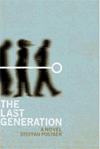I had a lot of alone time this Thanksgiving, as my girls went to Kansas City to see their cousins. I stayed back to spend the holiday with my dad’s side of the family. My grandfather is 97 and the Postaer men thought it proper to spend Thanksgiving with him. Come Friday, however, my father and brothers went to their respective homes on opposite coasts. That left me by myself, which was both nice and weird.
Being an introvert I’m already prone to introspection. Even in crowds, I hang out in my head. Needless to say, I was there a lot this long holiday weekend. Here’s the weird part: I kept on being nagged by this desire to buy stuff. Maybe it was all the holiday advertising beseeching me to get going on my Christmas shopping. But I actually think it runs deeper than that. I’d like to think I’m inured to the siren songs of the season, no matter how bright, brassy and loud they may be. After all, I am in the advertising business.
But I also have an addictive personality. It’s like there’s a hole in my person that demands being filled. Under it’s sway, I easily become restless, irritable and discontent. Back in the day I looked to fill the void in unhealthy ways. No more. These days I channel my obsessions with healthier activities like writing, reading and working out. But somewhere in between good for you and not good for you is the craving to buy things.
We like to joke about this craving for material possessions, calling hopeless cases “shopoholics.” Madonna sang about being a Material Girl. We laugh along with the powerless protagonist in Confessions of a Shopoholic. However, in the extreme this obsession can be just as troubling as any addiction.
Like a lot of men, I hate shopping. Still, I get urges. That new Macbook Air whispers to me. Normally, impervious to the lure of gadgets, my defenses weaken in the shiny, silver glare of Apple. Once the fever hits, I can also find myself dog-earing GQ magazine at this pair of boots or that sweater. I love watches, too. Cartier. Every year I covet their new watches, as if a gold and steel Chronograph will make me happy. Like I said, I hate shopping. But the Internet makes it so damn easy.
Understandably, advertisers would love nothing more than for all of us to succumb to these urges, to fill the holes in our souls with stuff and more stuff. Especially during the Holidays. Go nuts in December. Pay for it in January.
The last couple years the recession has tempered our consumerism. Retailers hope and pray not this year. They pray to pagan gods. Gluttony is not a sin when you’re doing it for others, right? Still, I wonder: Is there’s more to the name “Black Friday” than ledger sheets?
War… What is it good for? The Agency-Client conflict. Isn’t it time we gave peace of chance?
November 22, 2010
Conflict.
Not a happy word, is it? Particularly when it comes to agency/client relationships. Typically, conflicts are created when a marketing agency considers working for clients in the same category i.e. cars, QSR, etc. It’s not allowed.
There are countless examples, many we never hear about. On a personal level, two conflicts come to mind. The first involved my father, Larry Postaer and his agency. Back in the day, when DDB merged with Needham my dad was the CCO of Needham L.A. Their flagship account was Honda in America. Alas, DDB brought with it the Volkswagen car account, then more well known. Rather than give up Honda (which would’ve been the result), dad and his partner, Jerry Rubin elected to acquire the L.A. office (no simple feat) creating Rubin Postaer & Associates.
The second case involved a conflict within my current agency, Euro RSCG. In Chicago, we were quite proud of our work on Valspar paints, having helped launch the brand in America, A truly integrated case study, we did our finest work for them and won numerous awards for doing it. But then our European offices picked up the Dulux paint account, a huge player overseas. Our client had global aspirations, and despite support from their marketing department, the corporation gave no quarter. Chicago had to part ways with Valspar.
In the first case, all ended well. 30 years later, Rubin Postaer & Associates (now RPA) still enjoys a vigorously healthy relationship with Honda –and Acura for that matter.
The second conflict was not so kind. At least on a local level. We lost our creative flagship and an inspiring case study. For what? A brand most of us had never even heard of in a relationship 2,000 miles away.
I wonder if these so-called conflicts are just plain silly, especially in a time of multi conglomerates. Basically, there are only four or five advertising holding companies. The odds of them lording over clients in the same or similar category are overwhelming. Is it really fair to tax one agency over another? Similarly, on the client side, one company can own brands in numerous categories. If an agency commits to one brand does it have to defer to all the other categories in that client’s portfolio? Crazy.
What are we afraid of? That an account executive will run down the hall of his or her agency and steal trade secrets or marketing plans from another team working on a similar brand? Really? We trust that our CPA or lawyer won’t divulge delicate information to another member of the firm. Is our trustworthiness in Adland so fallible? Don’t answer that.
Frankly, in the transparent new world is any information all that precious, particularly in marketing. Ad campaigns are shared willy-nilly online. People tweet what they’re working on. Tag lines come and go. Why are we so protective of our work? No one else is.
In my opinion, conflicts are like appendixes. They usually cause harm and who wants them anyway?
AdAge, Entertainment Weekly and countless other pubs are running stories on how surprised everyone is about the success of TV show, The Walking Dead. Even the reporters who wrote the stories are amazed.
Really? Hell, I saw this hit shambling up Broadway in spring, when it was first reported in production. With Frank Darabont (Shawshank Redemption) and AMC (Mad Men) behind it, how could The Walking Dead miss?
The surprised ones keep pointing to the show’s characters and their struggle to survive as the reason for TWD’s success. They want to make it clear it’s not the bloody disgusting zombies, God forbid, that are pulling viewers in. Stop it! Of course you need to care about the characters. Otherwise you wouldn’t be frightened by the thought of said characters getting eaten and, better yet, turning into bloody disgusting ghouls themselves.
Don’t kid yourselves. It’s not only the ‘living’ that are interesting. They’re just food. It’s the dead. Put zombies on Gilligan’s Island and it’s gonna fucking work.
Why the insecurity around horror’s popularity? The mainstream treats it like pornography, denying its presence during the day yet wallowing in it at night.
Horror rules. Look at the success of True Blood, already in its 4th season. Granted, the show has a sexy cast and vampires have always been a dark turn-on. But still, compared to sissy shit like Twilight, True Blood has some serious bight. If it didn’t deliver the gore I wouldn’t watch. Lots of people wouldn’t.
Forget bloodsuckers, anyway. Zombies are the new vampires. What took them so long to get on TV? If we had to endure another clique of brooding poseurs pining over unrequited love I’d impale a wooden stake in my heart.
There is ample precedent for TWD’s success everywhere in popular culture. Before he directed SlumDog Millionaire, Danny Boyle helmed 28 Days Later and 28 Weeks Later. His hyper zombies killed at the box office. And deservedly so. Fact is ever since George Romero created the genre with his nightmare inducing Night of the Living Dead, the undead have been the gruesome princes of filmdom, helping to make horror the most consistently profitable genre in Hollywood. As for books, Oprah Winfrey chose Cormac McCarthy’s dystopian novel, The Road to be on her book club! (Okay, so the antagonists were cannibals not zombies. But it was Oprah Goddamn Winfrey!)
And yet we’re still surprised? Come on, people look alive. The Dead walk!
Thread for fans of The Walking Dead: Roamers and Lurkers
Site that broke news (for me) on The Walking Dead:28 Days Later Analysis
Lovely commercial, but is the Windows Phone really interested in getting you “back to life?”
November 17, 2010
The glossy new 60-second TV commercial for the Window’s Phone is a gorgeous piece of filmmaking. Great acting. Great directing. Great pacing. Great music. The copy sounds great, too: “It’s time for a phone to save us from our phones. New Windows Phone. Designed to get you in and out and back to life.”
Numerous vignettes depict painfully true scenarios of people staring into their Blackberries and Iphones while ignoring real life. My favorite (and there are many good ones) is of a bride texting at her very own wedding as her father walks her down the aisle. In all, the campaign is a very revealing portrait of our mobile culture. We multi-task therefore we miss out on “ real life.”
Unfortunately, the reasoning has a fatal flaw. A new piece of hardware or sizzling software isn’t going to change people’s behavior one iota. If anything, the Windows Phone will only make it worse. The fact that you can now get to your apps faster does not mean you will get done with them faster. That’s not what will happen and you know it. Instead of getting you somewhere quicker, a faster car on a faster track means you’ll only try and go farther.
The strategy for this lovely film is flawed because it doesn’t take into account the real motivation behind our obsession with smart phones. We want to be on them. We prefer being on them. Even when Sally’s so-called “real life” gets interesting (a date for example), it’s already happening to her. That fish is in the boat. Therefore, she needs to be working on the next date or checking in with her GF’s at the party. And so on. Right or wrong, that’s what people do.
Bottom line: If we spend too much time on our devices, the solution is not another device. For me selling the Window’s Phone this way is, at best, wishful thinking. However, it might not even matter, for any significant change or upgrade in technology will result in new sales, regardless of how it’s advertised. Just as likely is the chance Windows Phone is only feigning empathy for “quality time,” a rope-a-dope advertisers have been employing for years.
Within minutes of posting, I got a tweet from blogger, Marc Sherman about a piece he wrote saying the same damn thing as me! And another from Jason Fox. Holy Crap!







 The Happy Soul Industry
The Happy Soul Industry The Last Generation
The Last Generation